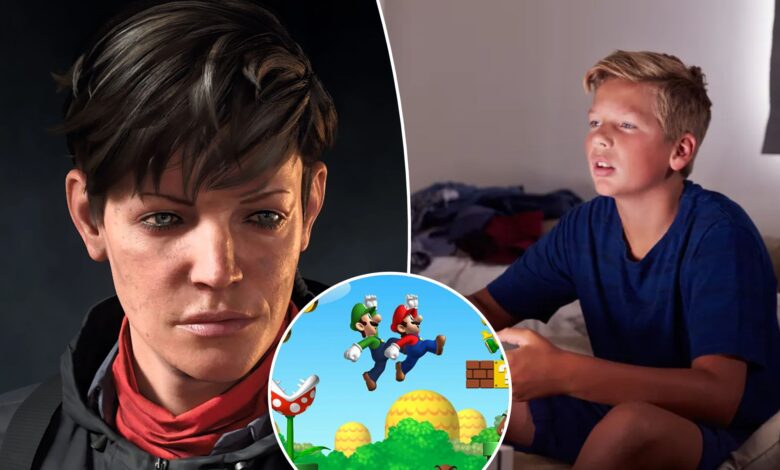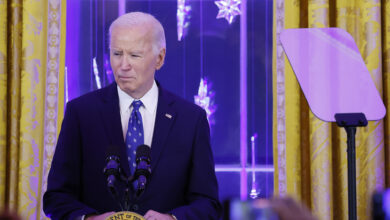Move over schools, DEI is taking over the world of video games

Donald Trump has vowed to dismantle as many DEI programs as possible when he returns to the White House. Yet, there’s one domain where diversity, equity, and inclusion aren’t just surviving—they’re thriving. The world of video games.
“Call of Duty,” one of the most iconic gaming franchises in history, recently introduced Rossi, its first nonbinary character with they/them pronouns. Some might dismiss this as mere virtue signaling, but it’s part of a far larger agenda.
As mainstream media declines, gaming — a market of 212 million US players —has become the perfect platform for DEI tenets to flourish.
DEI ideology first took root in universities, and today’s game developers are its natural byproducts.
Earlier this year, footage surfaced of Dani Lalonders, an associate narrative designer at EA’s Seattle-based Cliffhanger Games, openly bragging about excluding white people from her team for being “hard to work with.”
This is hardly an isolated incident. “Pokémon Legends: Arceus,” for instance, was accused by Vice of promoting colonialism (it doesn’t).
And “Super Mario Kart” has faced allegations of “white privilege,” despite Mario and Luigi being a pair of blue-collar plumbers trying to save a princess.
“Grand Theft Auto 6,” set to drop next year, looks poised to trade its edgy legacy for a dose of wokeness.
A former employee of maker Rockstar Games hinted fans might be “upset” by GTA’s new direction.
And the trailer suggests why.
It predominantly depicts African-American communities in a move many long-time fans dismissed as blatant identity politics.
Some viewers lamented on Reddit the near-absence of white characters and accused Rockstar Games of pushing a political agenda.
Lucia’s introduction as a Latina lead only intensified the backlash.
For DEI advocates, video games are appealing not just for their global player base, but for the amount of hours young, impressionable audiences spend immersed in these virtual worlds.
A quarter of Americans game 3-7 hours a week, another 25% play 8-12 hours, and 25% exceed 13 hours. Unlike TV shows, there are no ad breaks, no pauses — just relentless, uninterrupted engagement.
Sweet Baby Inc., a major player in gaming, may carry a cutesy name. However, the Montreal-based company has been instrumental in spreading harmful ideologies throughout the industry.
With its focus on game writing and diversity consulting, Sweet Baby has influenced titles like “God of War: Ragnarök,” “Marvel’s Spider-Man 2” and “Alan Wake 2.”
In “Ragnarök,” their politics are unmistakable, with the Norse goddess Angrboda reimagined as black.
The Norse were many things, but black wasn’t one of them.
Compare that with the company Ubisoft — where many Sweet Baby employees once worked.
The company is committed to accurate representation; so much so that their digital recreation of Notre Dame Cathedral became a critical reference for restoring the landmark after the 2019 fire.
The backlash against Sweet Baby has been brutal. On Steam, a digital gaming community, over 450,000 users have rallied behind a list titled “Sweet Baby Inc. detected,” boycotting any game influenced by the company’s ideology.
Some folks, however, applaud this focus on identity. “Spider-Man 2,” another Sweet Baby “triumph,” was praised by The Gamer for its relentless promotion of “queerness.”
The author of the piece, Jade King, described the game as “fruity,” praising the “distinct LGBTQ+ representation everywhere you look, from walls of street art to smaller side quests.”
Ms. King also praised the bisexuality of the character Black Cat calling it a perfect fit — a seductive thief who lures vulnerable men into her web, exploits them, and then flips the script by choosing to love another woman instead.
Is this a video game or a low-budget adult film?
Meanwhile, “Dragon Age: The Veilguard,” a brand-new fantasy role-playing game, allows users to create trans or non-binary heroes, reflecting gaming’s relentless push to make every narrative a vehicle for identity politics.
With only 0.5% of young adults identifying as transgender, this isn’t representation; it’s a distortion of reality.
The once-meritocratic world of gaming has been replaced by divisive ideology and bland storytelling. Complex characters and compelling narratives have given way to lifeless avatars designed to tick ideological boxes, reducing games to a dull binary of oppressors and oppressed. ‘
Gaming was once a sanctuary for creativity and exploration.
But like mainstream media and academia, it’s been hijacked by gatekeepers more obsessed with quotas than quality.
Mario and Luigi are barely scraping by; at this rate, the brothers might soon be out of work entirely.




